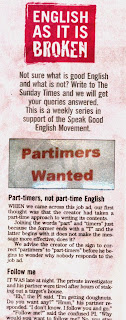 I think the weekly Sunday Times column, English As It Is Broken, serves a useful purpose to point out some of our common mistakes in the use of the English language. But I find that lately, they seem to be trying too hard to inject humour into the column, and this is at the expense of clarity. I think they should devote more space instead, to explaining the mistakes. Let’s take today’s 3 cases as examples.
I think the weekly Sunday Times column, English As It Is Broken, serves a useful purpose to point out some of our common mistakes in the use of the English language. But I find that lately, they seem to be trying too hard to inject humour into the column, and this is at the expense of clarity. I think they should devote more space instead, to explaining the mistakes. Let’s take today’s 3 cases as examples.1. Part-timers not Partimers
It was pointed out that just because the two words Part and Time end and begin with the letter ‘t’, it does not mean that we can join them to form a single word ‘partime’.
This was helpful as many of us may not be sure about this rule. However, the writers should have gone one step further to elaborate that there isn’t a single fixed rule for joining two words to form another word. For example, it is perfectly alright to join Pass and Time to form the word ‘pastime’ and not ‘pass-time’.
2. Follow Me
Here again, the writers wasted a lot of space to create a story to illustrate the incorrect use of the word ‘follow’. It would have been more helpful if they had simply explained the different applications of the word ‘follow’; for example to physically follow somebody as opposed to following his instructions or example.
3. Where Got?
I believe this one is not broken English at all. It is perfectly good Singlish which every Singaporean would understand. And I suspect, even the best (Singaporean) English professors would use it in daily conversation.
Again, instead of writing a lengthy story of how the expression is used, they have should devoted some space to explaining the origins of this Singlish expression. I believe it is a direct translation of the common Chinese phrase 哪里有 or ‘pin-toe-yau’ in Cantonese, or ‘toe-lok-oo’ in Hokkien. In fact, you frequently find this same expression - mana ada, being used in Malay.
Here again, the writers wasted a lot of space to create a story to illustrate the incorrect use of the word ‘follow’. It would have been more helpful if they had simply explained the different applications of the word ‘follow’; for example to physically follow somebody as opposed to following his instructions or example.
3. Where Got?
I believe this one is not broken English at all. It is perfectly good Singlish which every Singaporean would understand. And I suspect, even the best (Singaporean) English professors would use it in daily conversation.
Again, instead of writing a lengthy story of how the expression is used, they have should devoted some space to explaining the origins of this Singlish expression. I believe it is a direct translation of the common Chinese phrase 哪里有 or ‘pin-toe-yau’ in Cantonese, or ‘toe-lok-oo’ in Hokkien. In fact, you frequently find this same expression - mana ada, being used in Malay.





2 comments:
Hi Mr Lam,
This column is now done by a different team. The previous team had 'older' language consultants and there was at least one English teacher, if I remember correctly. I guess the approach is different now.
and then there's "newsstand". the only rule in english is that there are no rules.
Post a Comment